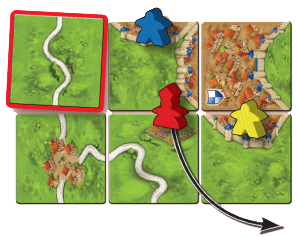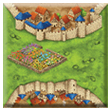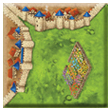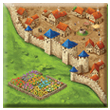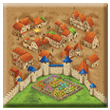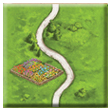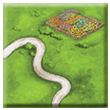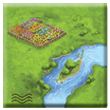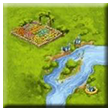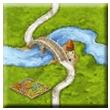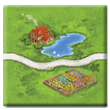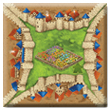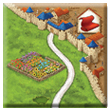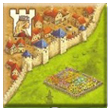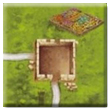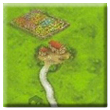The Abbot - Test
General info and comments
The Abbot was originally released by Hans im Glück in 2014.
It introduces the abbot meeple and garden features.
Along with The River, The Abbot is considered part of the basic game that can be used as desired. [1] It implements a mechanic that is unique to the new edition of Carcassonne, diverging in this aspect from the 1st edition.
With its introduction in 2014, tiles featuring gardens became available in the new design Base Game which included The River. Later, they appeared on tiles in the major expansions as they were re-released in the new artwork, and in Big Box 6 when it was released in 2017. [2] Bear in mind that The Abbot provides a new mechanic involving the abbot meeple, but the tiles it affects are not part of the expansion itself. Garden tiles that have been included in the base game and in expansions are listed for information in the tile distribution below.
Finally, it must be noted that the abbot in this expansion is not the same as the abbot used on special monasteries (German monasteries, Dutch & Belgian Monasteries, and Japanese buildings). The abbot in this expansion is a specialized meeple for monasteries (any monastic building [3]) and gardens whereas the abbot in special monasteries refers to any meeple placed sideways on special monasteries (placement as an abbot) as an alternative to placing the meeple standing (placement as a monk, the standard way for most features). Just in case things weren't confusing enough already.
Contents
- 5 abbots, one in each player color. [4]
Rules
Preparation
Each player adds the abbot of their color to their supply. With the exception of the new rules used with this mini-expansion, all basic Carcassonne rules remain unchanged.
Gameplay
1. Placing a tile
When placing a tile with a garden, you must place it so that it its edges match the edges of tiles already in play.
2. Placing a meeple
Placing a meeple or your abbot
When placing a tile with a monastery or a garden, you may place either a normal meeple or your abbot. The normal meeple is placed as usual whereas the abbot must be placed on the monastery or garden you've just placed. [5]
Removing and scoring an abbot [6]
In addition, the abbot has a special property. On your turn, you may decide to not place a meeple during phase 2. Placing a meeple, and may instead return your already-placed abbot to your supply. If you do so, you score immediately as many points as the garden or monastery your abbot occupied is worth at that moment, which corresponds to the value of the feature at the end of the game. [7] [8]
3. Scoring a feature
When the monastery or garden occupied by your abbot is surrounded by eight tiles, you score 9 points, as in the basic game. The garden is therefore scored the same as a monastery.
Final scoring
During final scoring, incomplete monasteries or gardens occupied by abbots are scored the same way as monasteries occupied by monks. [9]
Other expansions
The Abbot
General comments
- Valid features for the abbot:
 The abbot is considered a meeple, but it has limitations regarding its placement. (3/2015)
The abbot is considered a meeple, but it has limitations regarding its placement. (3/2015) An abbot meeple can be placed on the following features:
An abbot meeple can be placed on the following features:
- A monastic building:
- Monasteries (Base Game)
- Abbeys (Exp. 5 - Abbey & Mayor)
- Shrines (Exp. 6 - Count, King & Robber)
- German monasteries (Monasteries in Germany): placed as a monk or as an abbot
- Dutch & Belgian monasteries (Monasteries in the Netherlands & Belgium): placed as a monk or as an abbot
- Japanese buildings (Japanese Buildings): placed as a monk or as an abbot
- Darmstadt churches (Darmstadt Promo)
- A garden (The Abbot)
- A monastic building:
- All other features are forbidden, including cathedrals in cities (Exp. 1 - Inns and Cathedrals), which cannot be claimed, and German cathedrals (Cathedrals in Germany).
 Monastic buildings are a valid feature for abbots and all other meeple types except mayors (normal meeple, abbot, large meeple, wagon, ringmaster, phantom). However, gardens are a valid feature for abbots only.
Monastic buildings are a valid feature for abbots and all other meeple types except mayors (normal meeple, abbot, large meeple, wagon, ringmaster, phantom). However, gardens are a valid feature for abbots only.
- Special areas where an abbot can be placed:
 An abbot can also be deployed to special areas:
An abbot can also be deployed to special areas:
- The cathedral district in the city of Carcassonne (Exp. 6 - Count, King & Robber): since it can be re-deployed to a monastic building or a garden from there.
- The crown of the Wheel of Fortune (The Wheel of Fortune): since any meeple can be placed on the crown of the Wheel of Fortune
 An abbot can be trapped and moved to certain special features:
An abbot can be trapped and moved to certain special features:
- A free bathhouse (The Barber-Surgeons): if the abbot scored a completed feature on its own
- The Vodyanoy tile (Russian Promos): if adjacent to the feature with the abbot
- Placing and removing the abbot - when?:
 The abbot can be placed (or removed) when no other action is done as first placement (Step 2B-1):
The abbot can be placed (or removed) when no other action is done as first placement (Step 2B-1):
- No meeple is placed by direct placement, via a magic portal or flying machine (including in these cases an acrobat)
- No special figure is placed: builder, pig, barn of shepherd.
- No neutral figure is placed (fairy, tower floor)
- No token is placed (little building, no tollhouse token)
- No figure is removed with a festival
- After placing (or removing) the abbot (Step 2B-1), the active player can place their phantom as second figure (Step 2B-2).
- Placing or removing an abbot cannot take place if the current player removed a knight on the same turn with a princess tile.
 There is no limitation in the rules to prevent the active player from removing an abbot from a monastic building or garden just completed. This would allow the player to score early the abbot if threatened by the dragon or a tower.
There is no limitation in the rules to prevent the active player from removing an abbot from a monastic building or garden just completed. This would allow the player to score early the abbot if threatened by the dragon or a tower.
 Note: The rules indicate you can place an abbot meeple when not placing a "regular meeple," but they are also referring to other meeples and special figures not considered as meeples such as the builder, the pig, the shepherd or the barn, as can be implied according to the figure classification provided in Big Box 6 and making it extensive to all the expansions. Therefore this stipulation actually refers to not performing any other 2. Placing a meeple action at all but this is not explicitly stated. In other words, the publisher was keeping the rules as simple as possible at the moment when not all the new edition expansions had been released. (12/2014, updated 3/2015, updated 9/2018, updated 8/2020)
Note: The rules indicate you can place an abbot meeple when not placing a "regular meeple," but they are also referring to other meeples and special figures not considered as meeples such as the builder, the pig, the shepherd or the barn, as can be implied according to the figure classification provided in Big Box 6 and making it extensive to all the expansions. Therefore this stipulation actually refers to not performing any other 2. Placing a meeple action at all but this is not explicitly stated. In other words, the publisher was keeping the rules as simple as possible at the moment when not all the new edition expansions had been released. (12/2014, updated 3/2015, updated 9/2018, updated 8/2020)
- Placing the abbot - how?:
 The abbot can be deployed onto an unoccupied, incomplete valid feature by direct placement.
The abbot can be deployed onto an unoccupied, incomplete valid feature by direct placement. The abbot can use a magic portal and can be used as a flier. However, the abbot can only end up on an unfinished monastery or garden, and the monastery or garden must be unclaimed if using the magic portal. (3/2015)
The abbot can use a magic portal and can be used as a flier. However, the abbot can only end up on an unfinished monastery or garden, and the monastery or garden must be unclaimed if using the magic portal. (3/2015) The abbot can be placed directly on an unoccupied space on the Wheel of Fortune.
The abbot can be placed directly on an unoccupied space on the Wheel of Fortune.
- Removing and scoring the abbot - how?:
 This scoring occurs immediately during the 2. Placing a meeple phase when the abbot is removed. This effectively protects the abbot from the dragon and produces a scoring round for Messages. Afterwards, the normal scoring phase occurs. (3/2015)
This scoring occurs immediately during the 2. Placing a meeple phase when the abbot is removed. This effectively protects the abbot from the dragon and produces a scoring round for Messages. Afterwards, the normal scoring phase occurs. (3/2015) No majority is applicable to the removal and scoring of an abbot, even if several meeples are present on the feature. Likewise, no meeples can be deployed from Carcassonne to the feature with the abbot being scored.
No majority is applicable to the removal and scoring of an abbot, even if several meeples are present on the feature. Likewise, no meeples can be deployed from Carcassonne to the feature with the abbot being scored. Basic scoring (square tiles only): an abbot scores 1 point for the feature tile and 1 point per adjacent tile.
Basic scoring (square tiles only): an abbot scores 1 point for the feature tile and 1 point per adjacent tile.
- If the feature was just completed, the abbot will score 9 points.
- If the feature is still incomplete, the abbot will score 1 point for the feature and 1 per adjacent tile.
- No additional bonus points associated to the feature will be applied.
 General scoring (all tile geometries): an abbot is worth 1 point for the space occupied by the feature with the abbot and 1 point per occupied adjacent square space.
General scoring (all tile geometries): an abbot is worth 1 point for the space occupied by the feature with the abbot and 1 point per occupied adjacent square space.
- If the feature was just completed, the abbot will score 9 points, no matter the type of tiles surrounding it.
- If the feature with the abbot is incomplete, the abbot will score as many points as the number of occupied spaces considering the feature and its adjacent square spaces.
- No additional bonus points associated to the feature will be applied.
- Note: The basic scoring is applicable most cases but needs a revision if playing with expansions incorporating tiles with other geometries. In these cases, we will consider "occupied square spaces" instead of simply "tiles":
- A square tile occupies a square space, so there is a 1-to-1 correspondence.
- If playing with triangular tiles (Halflings), an adjacent space may be occupied by one or two triangular tiles to be considered occupied.
- If playing with double-sized tiles (Castles in Germany, The Markets of Leipzig), one of these tiles may occupy one or two adjacent spaces.
- Note: The basic scoring is applicable most cases but needs a revision if playing with expansions incorporating tiles with other geometries. In these cases, we will consider "occupied square spaces" instead of simply "tiles":
 Bonus points: The scoring of the abbot (even on a just completed feature) in phase 2. Placing a meeple is different from the scoring of the completed feature in phase 3. Scoring a feature. This means that no majority is applied (if several figures are present on the feature) and any bonus points associated to the scoring of a completed feature are not taken into consideration for the abbot scoring, for example:
Bonus points: The scoring of the abbot (even on a just completed feature) in phase 2. Placing a meeple is different from the scoring of the completed feature in phase 3. Scoring a feature. This means that no majority is applied (if several figures are present on the feature) and any bonus points associated to the scoring of a completed feature are not taken into consideration for the abbot scoring, for example:
- Exp. 3 - The Princess & the Dragon: The 3-point fairy scoring bonus if the fairy is next to the abbot
- Exp. 9 - Hills & Sheep: Vineyard points if the abbot is on a monastic building
- The Land Surveyors: Scoring tile bonus/penalties affecting a monastic building
- Little Buildings: Bonus points for any little buildings on the feature tile or on any neighboring tile.
- Darmstadt Promo: The Darmstadt church bonus points if the abbot is on a Darmstadt church
- Analogously, if the abbot is participating in a challenge, the early removal and scoring of an abbot would end it (Exp. 6 - Count, King & Robber).
- Applicability of actions associated to scoring features:
 Since removing and scoring an abbot takes place in phase 2. Placing a meeple, it has no relationship or impact in actions related to scoring happening in phase 3. Scoring a feature, such as:
Since removing and scoring an abbot takes place in phase 2. Placing a meeple, it has no relationship or impact in actions related to scoring happening in phase 3. Scoring a feature, such as:
- Sending a meeple to Carcassonne: this action cannot be triggered by the scoring of an abbot (Exp. 6 - Count, King & Robber).
- Re-deploying a meeple from Carcassonne: this action cannot be used to place additional meeples on the feature with the abbot being removed and scored (Exp. 6 - Count, King & Robber).
- Sending a meeple to a free bathhouse: this action cannot be triggered by the scoring of an abbot (The Barber-Surgeons).
- Scoring features with abbots:
 Even if occupied by abbots, the scoring of completed features in phase 3. Scoring a feature or after the game will follow the usual rules:
Even if occupied by abbots, the scoring of completed features in phase 3. Scoring a feature or after the game will follow the usual rules:
- Monastic buildings with one or more meeples (including abbots) will follow the usual scoring rules defined in the base game (Base Game).
- A garden with one or more abbots will follow the usual scoring rules for the feature (see below for more details).
- Note: In general terms, monastic buildings and gardens are usually occupied by one meeple only. Some expansions allow players to deploy more than one meeple to these features during the game, so the majority will have to be considered in these cases when scoring those features (as usual for other features):
- A flying machine will allow you to deploy several meeples to a monastic building or a garden (Mini #1 - The Flier (Flying Machines)).
- Right before scoring, players would be allowed to deploy additional meeples to a monastic buildings from the cathedral district in the city of Carcassonne (Exp. 6 - Count, King & Robber).
- Note: In general terms, monastic buildings and gardens are usually occupied by one meeple only. Some expansions allow players to deploy more than one meeple to these features during the game, so the majority will have to be considered in these cases when scoring those features (as usual for other features):
Details
![]() Exp. 3 - The Princess & the Dragon:
Exp. 3 - The Princess & the Dragon:
- Princess tiles:
- Placing and scoring an abbot:
 An abbot cannot placed or removed if the active player used a princess tile to remove a knight.
An abbot cannot placed or removed if the active player used a princess tile to remove a knight.
- Magic portals:
- Placing an abbot:
 An abbot can use a magic portal. However, the abbot can only end up on an unfinished, unclaimed monastic building or garden. (3/2015)
An abbot can use a magic portal. However, the abbot can only end up on an unfinished, unclaimed monastic building or garden. (3/2015)
- The fairy:
- Placing the fairy:
 The fairy can be assigned to an abbot.
The fairy can be assigned to an abbot.
- Scoring an abbot:
 If the fairy is next to an abbot being removed and scored, the 3-point fairy scoring bonus is not applicable, since no feature is scored.
If the fairy is next to an abbot being removed and scored, the 3-point fairy scoring bonus is not applicable, since no feature is scored.
- The dragon:
- The dragon's meal plan:
 The dragon can eat an abbot.
The dragon can eat an abbot.
- Scoring an abbot:
 The removal and scoring of the abbot takes place before the dragon moves.
The removal and scoring of the abbot takes place before the dragon moves.
![]() Exp. 4 - The Tower:
Exp. 4 - The Tower:
- Tower actions:
 The abbot can be captured by a tower.
The abbot can be captured by a tower. The abbot cannot be placed on a tower.
The abbot cannot be placed on a tower.
![]() Exp. 5 - Abbey & Mayor:
Exp. 5 - Abbey & Mayor:
- Abbeys:
- Placing an abbot:
 An abbot can be placed on an abbey, as it is considered a monastery (a monastic building).
An abbot can be placed on an abbey, as it is considered a monastery (a monastic building).
![]() Exp. 6 - Count, King & Robber:
Exp. 6 - Count, King & Robber:
- The Cultists:
- Placing an abbot:
 An abbot can be placed on a shrine/cult place, as it is considered a monastery (a monastic building), albeit a heretic one.
An abbot can be placed on a shrine/cult place, as it is considered a monastery (a monastic building), albeit a heretic one.
- Abbots and challenges:
 An abbot on a monastic building can participate in a challenge.
An abbot on a monastic building can participate in a challenge. An abbot on a garden cannot participate in a challenge.
An abbot on a garden cannot participate in a challenge. The abbot's special ability (removing and scoring an abbot) allows it to quit a challenge, even if its feature (monastery, abbey, shrine/cult place...) is not complete, and will score the as many points as the incomplete feature at that point.
The abbot's special ability (removing and scoring an abbot) allows it to quit a challenge, even if its feature (monastery, abbey, shrine/cult place...) is not complete, and will score the as many points as the incomplete feature at that point.
- The Count of Carcassonne:
- Abbots and the city of Carcassonne:
 The abbot can only be placed in the cathedral district in the city of Carcassonne.
The abbot can only be placed in the cathedral district in the city of Carcassonne. The abbot in the city of Carcassonne can only be deployed to a monastic building. Gardens are not a valid destination in this case.
The abbot in the city of Carcassonne can only be deployed to a monastic building. Gardens are not a valid destination in this case.
- Scoring an abbot:
 The city of Carcassonne is not involved in the removal and scoring of abbots.
The city of Carcassonne is not involved in the removal and scoring of abbots.
![]() Exp. 8 - Bridges, Castles and Bazaars:
Exp. 8 - Bridges, Castles and Bazaars:
- Castles:
- Scoring an abbot:
 An abbot, when removed an scored, does not trigger the scoring of a neighboring castle in phase 2. Placing a meeple, even if the monastic building or garden was just completed. After the abbot is removed and scored, if the feature was completed, the scoring of any neighboring castle will be triggered in phase 3. Scoring a feature.
An abbot, when removed an scored, does not trigger the scoring of a neighboring castle in phase 2. Placing a meeple, even if the monastic building or garden was just completed. After the abbot is removed and scored, if the feature was completed, the scoring of any neighboring castle will be triggered in phase 3. Scoring a feature.
![]() Exp. 9 - Hills & Sheep:
Exp. 9 - Hills & Sheep:
- Vineyards:
- Scoring an abbot:
 If the abbot is removed and scored from a monastic building, no vineyard points can be considered.
If the abbot is removed and scored from a monastic building, no vineyard points can be considered.
- The Inguisition event:
 An abbot on a monastic building except a shrine will be considered for the Inquisition event, since it is a monk (no matter if is placed as a monk or as an abbot).
An abbot on a monastic building except a shrine will be considered for the Inquisition event, since it is a monk (no matter if is placed as a monk or as an abbot). An abbot on a garden cannot be considered for the Inquisition event, since it is not a monk.
An abbot on a garden cannot be considered for the Inquisition event, since it is not a monk.
- The crown spaces:
 An abbot can be placed on a unoccupied crown space of the Wheel of Fortune, the same as any other meeple. The abbot placement limitation does not apply to this special feature.
An abbot can be placed on a unoccupied crown space of the Wheel of Fortune, the same as any other meeple. The abbot placement limitation does not apply to this special feature.
![]() Mini #1 - The Flier (Flying Machines):
Mini #1 - The Flier (Flying Machines):
- An abbot as a flier:
 An abbot can be used as a flier. However, the abbot can only end up on an unfinished monastery (any monastic building) or garden, no matter if it is already occupied. (3/2015) [10]
An abbot can be used as a flier. However, the abbot can only end up on an unfinished monastery (any monastic building) or garden, no matter if it is already occupied. (3/2015) [10]
- Scoring an abbot (sharing a feature):
 If playing with Mini #1 - The Flier (Flying Machines), several meeples may occupy the same feature. As a consequence, multiple abbots may occupy a monastic building or a garden. If so, each abbot could be removed and scored separately before the feature is completed. This means, the monastic building or garden could be partially scored several times before it is completed. When scored during or after the game, a monastic building or garden with several meeples will take into account the majority on the feature. Abbots have a 1 majority vote.
If playing with Mini #1 - The Flier (Flying Machines), several meeples may occupy the same feature. As a consequence, multiple abbots may occupy a monastic building or a garden. If so, each abbot could be removed and scored separately before the feature is completed. This means, the monastic building or garden could be partially scored several times before it is completed. When scored during or after the game, a monastic building or garden with several meeples will take into account the majority on the feature. Abbots have a 1 majority vote.
![]() Mini #2 - The Messages (Dispatches):
Mini #2 - The Messages (Dispatches):
- Scoring an abbot:
 The abbot, when removed and scored, generates a round of scoring and therefore the active player may receive Messages at that point of the turn sequence.
The abbot, when removed and scored, generates a round of scoring and therefore the active player may receive Messages at that point of the turn sequence.
![]() Mini #4 - The Goldmines:
Mini #4 - The Goldmines:
- Scoring an abbot:
 The abbot, when removed and scored, doesn't allow the active player to collect any gold ingots in its neighboring tiles, even if the feature was just completed. The scoring of the abbot takes in phase 2. Placing a meeple is different from the scoring of the completed feature in phase 3. Scoring a feature, the the gold ingots are collected.
The abbot, when removed and scored, doesn't allow the active player to collect any gold ingots in its neighboring tiles, even if the feature was just completed. The scoring of the abbot takes in phase 2. Placing a meeple is different from the scoring of the completed feature in phase 3. Scoring a feature, the the gold ingots are collected.
![]() Monasteries in Germany / Monasteries in the Netherlads & Belgium / Monasteries:
Monasteries in Germany / Monasteries in the Netherlads & Belgium / Monasteries:
- Placing an abbot meeple as an abbot (sideways):
 An abbot can be placed onto other features considered monasteries such as special monasteries: German monasteries, Dutch & Belgian monasteries, Japanese buildings. In this case, the abbot can be placed as a monk (standing) or as an abbot (placed sideways).
An abbot can be placed onto other features considered monasteries such as special monasteries: German monasteries, Dutch & Belgian monasteries, Japanese buildings. In this case, the abbot can be placed as a monk (standing) or as an abbot (placed sideways). An abbot placed as an abbot (sideways) on a special monastery (German monastery, Dutch & Belgian monastery or Japanese building) could be also removed as per the interpretation of the rules. If removed, it would be scored as a meeple placed as an abbot at the end of the game. The rules don't contain any limitation to prevent players from doing so. An official clarification would be necessary.
An abbot placed as an abbot (sideways) on a special monastery (German monastery, Dutch & Belgian monastery or Japanese building) could be also removed as per the interpretation of the rules. If removed, it would be scored as a meeple placed as an abbot at the end of the game. The rules don't contain any limitation to prevent players from doing so. An official clarification would be necessary.
- Removing an abbot without scoring:
 An abbot can be removed with a Festival tile. If so, no abbot scoring would take place.
An abbot can be removed with a Festival tile. If so, no abbot scoring would take place.
- Sending an abbot to a bathhouse:
 An abbot will be sent to a free bathhouse when scoring a completed feature occupied only by the abbot.
An abbot will be sent to a free bathhouse when scoring a completed feature occupied only by the abbot.
- Scoring an abbot:
 An abbot removed and scored cannot be sent to a free bathhouse, since there is no feature scoring involved.
An abbot removed and scored cannot be sent to a free bathhouse, since there is no feature scoring involved.
- Swapping abbots:
 Meeple exchanges caused by La Porxada require that any meeple redeployed ends up on a valid feature. This also applies to abbots.
Meeple exchanges caused by La Porxada require that any meeple redeployed ends up on a valid feature. This also applies to abbots.
- Scoring an abbot:
 Scoring tile bonus/penalties do not affect the scoring of an abbot when removed and scored.
Scoring tile bonus/penalties do not affect the scoring of an abbot when removed and scored. Scoring tile bonus/penalties affect the completed feature occupied by an abbot.
Scoring tile bonus/penalties affect the completed feature occupied by an abbot.
- Placing an abbot:
 An abbot can be placed onto other features considered monasteries such as Darmstadt churches.
An abbot can be placed onto other features considered monasteries such as Darmstadt churches.
- Scoring an abbot:
 If an abbot is removed and scored from an Darmstadt church, the Darmstadt church bonus cannot be applied, even if the church was just finished.
If an abbot is removed and scored from an Darmstadt church, the Darmstadt church bonus cannot be applied, even if the church was just finished.
- Scoring an abbot:
 The abbot, when removed and scored, will not receive points from neighboring little buildings, even if the feature monastic building or the garden was just completed, since the abbot is not scoring the feature.
The abbot, when removed and scored, will not receive points from neighboring little buildings, even if the feature monastic building or the garden was just completed, since the abbot is not scoring the feature.
- Vodyanoy and an abbot:
 The Vodyanoy tile can capture an abbot placed on an adjacent tile.
The Vodyanoy tile can capture an abbot placed on an adjacent tile.
Gardens
General comments
- Gardens are not monastic buildings:
 Gardens can only be occupied by abbots. No other meeple types are allowed on a garden.
Gardens can only be occupied by abbots. No other meeple types are allowed on a garden. Gardens do not count as monastic buildings in relation to their interaction with other expansions. (10/2018)
Gardens do not count as monastic buildings in relation to their interaction with other expansions. (10/2018) This means that gardens will not benefit from the following bonus points applicable to monastic buildings:
This means that gardens will not benefit from the following bonus points applicable to monastic buildings:
- Exp. 9 - Hills & Sheep: Vineyards
- The Wheel of Fortune: The Inquisition event
- Mini #2 - The Messages (Dispatches): Message 3 (Smallest monastery)
- The Watchtowers: Bonus for monasteries (monastic buildings)
- The Markets of Leipzig: Bookbinders quarter bonus
- The Land Surveyors: Scoring tile bonus/penalties affecting a monastic building
- Completing a garden:
- A garden is completed when all its adjacent square spaces are occupied by tiles:
- In general terms, this means 8 adjacent square tiles.
- If playing with triangular tiles (Halflings), an adjacent space can be occupied by one or two triangular tiles to be considered occupied. This means, triangular gaps are not considered when deciding if a garden is completed.
- If playing with double-sized tiles (Castles in Germany, The Markets of Leipzig), one of these tiles may occupy one or two adjacent spaces.
- A garden is completed when all its adjacent square spaces are occupied by tiles:
- Scoring a garden:
 Gardens are usually occupied by one abbot. If playing with Mini #1 - The Flier (Flying Machines), several abbots may occupy the same feature. If so, the majority will be taken into consideration when scoring the feature.
Gardens are usually occupied by one abbot. If playing with Mini #1 - The Flier (Flying Machines), several abbots may occupy the same feature. If so, the majority will be taken into consideration when scoring the feature.
 Basic scoring (square tiles only): a garden is worth 1 point for the feature tile and 1 point per adjacent tile.
Basic scoring (square tiles only): a garden is worth 1 point for the feature tile and 1 point per adjacent tile.
- If the feature was just completed, the garden is worth 9 points.
- If the feature is incomplete, the garden is worth 1 point for the feature and 1 per adjacent tile.
- Additional bonus points may apply.
 General scoring (all tile geometries): a garden is worth 1 point for the space occupied by the feature with the abbot and 1 point per occupied adjacent square space.
General scoring (all tile geometries): a garden is worth 1 point for the space occupied by the feature with the abbot and 1 point per occupied adjacent square space.
- If the feature was just completed, the garden is worth 9 points, no matter the type of tiles surrounding it.
- If the feature is incomplete, the garden is worth as many points as the number of occupied spaces considering the feature and its adjacent square spaces.
- Additional bonus points may apply.
- Note: The basic scoring is applicable most cases but needs a revision if playing with expansions incorporating tiles with other geometries. In these cases, we will consider "occupied square spaces" instead of simply "tiles":
- A square tile occupies a square space, so there is a 1-to-1 correspondence.
- If playing with triangular tiles (Halflings), an adjacent space may be occupied by one or two triangular tiles to be considered occupied.
- If playing with double-sized tiles (Castles in Germany, The Markets of Leipzig), one of these tiles may occupy one or two adjacent spaces.
 Bonus points: Some additional bonuses may apply when scoring a garden during and after the game:
Bonus points: Some additional bonuses may apply when scoring a garden during and after the game:
- Exp. 3 - The Princess & the Dragon: The 3-point fairy scoring bonus if the fairy is next to the abbot
- Little Buildings: Bonus points for any little buildings on the garden tile or on any adjacent tile.
Details
![]() Exp. 3 - The Princess & the Dragon:
Exp. 3 - The Princess & the Dragon:
- The fairy:
- Scoring a garden:
 If the fairy is next to an abbot on a garden being scored, the abbot will receive the 3-point fairy scoring bonus.
If the fairy is next to an abbot on a garden being scored, the abbot will receive the 3-point fairy scoring bonus.
![]() Exp. 6 - Count, King & Robber:
Exp. 6 - Count, King & Robber:
- The Cultists:
- Abbots and challenges:
 An abbot on a garden cannot participate in a challenge.
An abbot on a garden cannot participate in a challenge.
- The Count of Carcassonne::
- Gardens and the city of Carcassonne:
 An abbot in the city of Carcassonne cannot be deployed to a garden from the cathedral district, since a garden it is not a monastic building.
An abbot in the city of Carcassonne cannot be deployed to a garden from the cathedral district, since a garden it is not a monastic building.
![]() Exp. 7 - The Catapult:
Exp. 7 - The Catapult:
- Seduction token:
 Meeple exchanges caused by the Seduction token require that any meeple redeployed ends up on a valid feature. This also applies to abbots.
Meeple exchanges caused by the Seduction token require that any meeple redeployed ends up on a valid feature. This also applies to abbots.
![]() Exp. 8 - Bridges, Castles and Bazaars:
Exp. 8 - Bridges, Castles and Bazaars:
- Castles:
- Scoring a garden:
 A completed garden will trigger the scoring of a neighboring castle if the garden tile is in the castle fief.
A completed garden will trigger the scoring of a neighboring castle if the garden tile is in the castle fief.
![]() Exp. 9 - Hills & Sheep
Exp. 9 - Hills & Sheep
- Vineyards:
- Scoring a garden:
 Vineyard points do not apply to gardens, since they are not monastic buildings.
Vineyard points do not apply to gardens, since they are not monastic buildings.
- The Inguisition event:
 An abbot on a garden cannot be considered for the Inquisition event, since it is not a monk.
An abbot on a garden cannot be considered for the Inquisition event, since it is not a monk.
![]() Mini #2 - The Messages (Dispatches):
Mini #2 - The Messages (Dispatches):
- Message 3:
 Message 3 (Smallest monastery) does not apply to gardens, since they are not monastic buildings. [11]
Message 3 (Smallest monastery) does not apply to gardens, since they are not monastic buildings. [11]
![]() Mini #4 - The Goldmines:
Mini #4 - The Goldmines:
- Scoring a garden:
 The scoring of a completed garden entitles the owner(s) to collect gold ingots in neighboring tiles.
The scoring of a completed garden entitles the owner(s) to collect gold ingots in neighboring tiles.
- Watchtower bonus for monasteries (monastic buildings):
 The watchtower bonus for monasteries (monastic buildings in general) does not apply to gardens, since they are not monastic buildings.
The watchtower bonus for monasteries (monastic buildings in general) does not apply to gardens, since they are not monastic buildings.
- Bookbinders quarter bonus for monasteries (monastic buildings):
 The Bookbinders quarter bonus does not apply to gardens, since they are not monastic buildings.
The Bookbinders quarter bonus does not apply to gardens, since they are not monastic buildings.
- Scoring tiles for monasteries (monastic buildings):
- Scoring a garden:
 Scoring tile bonus/penalties affecting monastic buildings do not affect gardens, since they are not monastic buildings.
Scoring tile bonus/penalties affecting monastic buildings do not affect gardens, since they are not monastic buildings.
- Escaping a besieged city:
 A knight cannot escape from a city via a garden, since it is not a monastic building.
A knight cannot escape from a city via a garden, since it is not a monastic building.
- Scoring a garden:
 A completed garden will receive bonus points for any neighboring little building placed on the feature tile or any adjacent tile.
A completed garden will receive bonus points for any neighboring little building placed on the feature tile or any adjacent tile.
Tile distribution
The following tile distribution includes all the tiles featuring a garden that can be found in the Base Game and the expansions released until now (12/2018) for the new edition.
![]() Exp. 3 - The Princess & the Dragon
Exp. 3 - The Princess & the Dragon
Footnotes
For Icons explanation and licensing please visit Icons page.
- ↑
 As stated in the rules of Big Box 6.
As stated in the rules of Big Box 6.
- ↑
 The expansions included in Big Box 6 that contained garden tiles are Exp. 1 - Inns & Cathedrals, Exp. 2 - Traders & Builders, Mini #1 - The Flier (Flying Machines), Mini #5 - Mage & Witch and Mini #6 - The Robbers.
The expansions included in Big Box 6 that contained garden tiles are Exp. 1 - Inns & Cathedrals, Exp. 2 - Traders & Builders, Mini #1 - The Flier (Flying Machines), Mini #5 - Mage & Witch and Mini #6 - The Robbers.
- ↑
 We refer to all the features equivalent to monasteries as monastic buildings:
We refer to all the features equivalent to monasteries as monastic buildings:
- Monasteries (Base Game)
- Abbeys (Exp. 5 - Abbey & Mayor)
- Shrines (Exp. 6 - Count, King & Robber)
- German monasteries (Monasteries in Germany)
- Dutch & Belgian monasteries (Monasteries in the Netherlands & Belgium)
- Japanese buildings (Japanese Buildings)
- Darmstadt churches (Darmstadt Promo)
- ↑
 As far as the Big Box 6 is concerned, the sixth set of (pink) meeples is a part of the basic game, not Exp. 1 - Inns & Cathedrals. The same happens in Big Box 6 with the sixth abbot meeple. Prior to Big Box 6, the standalone base game included five abbots, with the sixth included with the sixth set of meeples in Exp. 1 - Inns & Cathedrals.
As far as the Big Box 6 is concerned, the sixth set of (pink) meeples is a part of the basic game, not Exp. 1 - Inns & Cathedrals. The same happens in Big Box 6 with the sixth abbot meeple. Prior to Big Box 6, the standalone base game included five abbots, with the sixth included with the sixth set of meeples in Exp. 1 - Inns & Cathedrals.
- ↑
 A regular meeple may be placed on a monastery or other features available on the tile, such as roads or fields, but it may not be be placed on a garden. An abbot may only be placed on a monastery or a garden.
A regular meeple may be placed on a monastery or other features available on the tile, such as roads or fields, but it may not be be placed on a garden. An abbot may only be placed on a monastery or a garden.
- ↑
 The HiG rules describe this action as a special scoring case taking place in phase 2. Placing a meeple. The Big Box 6 rules include it in phase 3. Scoring a feature although mentioning the phase where it takes place. We have relocated this action to its correct place to avoid this discrepancy.
The HiG rules describe this action as a special scoring case taking place in phase 2. Placing a meeple. The Big Box 6 rules include it in phase 3. Scoring a feature although mentioning the phase where it takes place. We have relocated this action to its correct place to avoid this discrepancy.
- ↑
 The wording of the rules assumes the scoring of an incomplete monastery or garden. However, there is no explicit limitation in the rules to prevent the active player from removing their abbot from a feature just completed.
The wording of the rules assumes the scoring of an incomplete monastery or garden. However, there is no explicit limitation in the rules to prevent the active player from removing their abbot from a feature just completed.
- ↑
 Removing an abbot triggers an immediate scoring associated to the figure. So this scoring is not related to the feature it occupies. Note that an abbot scoring take places in phase 2. Placing a meeple and not in phase 3. Scoring a feature, when all completed features are scored.
Removing an abbot triggers an immediate scoring associated to the figure. So this scoring is not related to the feature it occupies. Note that an abbot scoring take places in phase 2. Placing a meeple and not in phase 3. Scoring a feature, when all completed features are scored.
- ↑
 At the end of the game, the abbot is scored like a normal monk.
At the end of the game, the abbot is scored like a normal monk.
- ↑
 In contrast with this previous clarification from 3/2015, the Order of Play included in Big Box 6 omits the abbot from the list of figures that can be a flier. This omission is due to a mistake by HiG, as confirmed by one of the German proofreaders (Kettlefish) in this post from 5/2018 on Carcassonne Central:
In contrast with this previous clarification from 3/2015, the Order of Play included in Big Box 6 omits the abbot from the list of figures that can be a flier. This omission is due to a mistake by HiG, as confirmed by one of the German proofreaders (Kettlefish) in this post from 5/2018 on Carcassonne Central:
http://www.carcassonnecentral.com/community/index.php?topic=3384.msg58360#msg58360
The same omission is still present in rules translated into other languages. (01/2019) - ↑
 Gardens do not count as monasteries in relation to their interaction with other expansions, such as Message 3 (Smallest monastery) from Mini #2 - The Messages (Dispatches). (10/2018)
Gardens do not count as monasteries in relation to their interaction with other expansions, such as Message 3 (Smallest monastery) from Mini #2 - The Messages (Dispatches). (10/2018)
Clarification by Christof Tisch (HiG) on BGG:
https://boardgamegeek.com/thread/2060792/article/30130380#30130380



